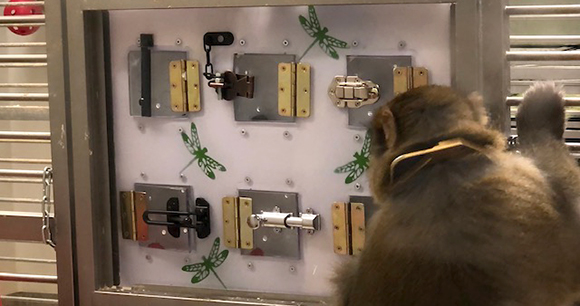Exploring Macaques’ Preference for Physical vs. Touch Screen Cognitive Enrichment
by Brittney Armitage-Brown, VT, RLAT, Research Assistant; Darlene Potterton, VT, RLAT, Veterinary Technician; Dr. Brian Coe, Senior Research Scientist; and Dr. Andrew Winterborn, University Veterinarian of Queen’s University
Enrichment that encourages natural exploratory behaviors is important to the welfare of nonhuman primates in research. The purpose of this project, which was funded by an AWI Refinement Grant, was to enhance cognitive enrichment for nonhuman primates and determine whether they prefer physical or touch screen tasks. Two devices were created for their use: a puzzle board (see photo below) and a tablet board.

The puzzle board consisted of a plexiglass backing with six doored compartments, each with its own unique lock of varying degrees of difficulty; within each compartment was a reward (jujube or chocolate-covered jujube). The tablet contained pre-installed software with four selectable boxes: sound, light, video, or drawing. Pressing on a box opened another set of three possible boxes (except in the case of drawing), each loading an independent video, sound, or light enrichment. A small amount of peanut butter was placed on the screen to encourage interaction. The animals—six female and four male rhesus macaques—were offered access to each device for 20-minute sessions. Devices were rotated daily for one week. Animals were observed live or recorded for, among other things, total time engaging and successful use of the item (i.e., how many items were touched, locks unlocked, or boxes pressed). Animals who were pair-housed (two males) or group-housed (all six females) were separated from their partners for individual trials; animals remained in their home pen during trials.
Six of the 10 monkeys interacted with both devices. Two interacted with neither. One interacted with the tablet but not the puzzle, and one interacted with the puzzle but not the tablet. The six individuals who interacted with both devices spent far more time interacting with the puzzle board than with the tablet (mean ± standard deviation: 593 ± 275 seconds for the puzzle board vs. 210 ± 122 seconds for the tablet; p = 0.009). On average, the animals unlocked 3 of 6 compartments on the puzzle board and pressed 4 of 14 possible buttons on the touch screen. Engagement with the tablet device may have been skewed to encourage touch, as it had peanut butter applied to the screen; however, from previously completed trials without peanut butter, this did not significantly increase the amount of engagement time with the device. Once the animals became curious over changes in the screen brought on by their manipulations, engagement time went up.
The animals did not engage with either device to a significant degree initially, although the animals engaged longer and were more successful through the trials with the puzzle board than with the tablet. Cognitive and interactive opportunities (as well as rewards) differ between the devices. Studying what captures their interest allows us to adapt enrichment to better meet their needs. Having staff assist the animals initially with the tablet may result in longer engagement times. Future studies are planned to train animals on use of the tablets, in contrast to this study, which focused on reaction to novel items and preference between devices.
This study was funded by the AWI Refinement Research Award program. Learn more about this program or view additional studies.
Program Terms: Animals in Laboratories
AWI Quarterly Terms: Feature Article
Related News
New Analysis: Animal Welfare Act Enforcement Deteriorates Following SCOTUS Ruling
In Program: Animals in LaboratoriesThe US Department of Agriculture, long known for its lackluster enforcement of the Animal Welfare Act (AWA), appears in recent years to have drifted even...
AWI Statement on Trump Administration’s Plan to Reduce Animal Experimentation Amid Attack on Science
In Program: Animals in LaboratoriesThe Animal Welfare Institute (AWI) applauds recent announcements by the National Institutes of Health and the US Food and Drug Administration about their plans to reduce the use of...
AWI Scholarship Winners Campaign for a Better World for Animals
In Program: Animals in Laboratories, Farmed AnimalsThe Animal Welfare Institute (AWI) announced today the 12 winners of a scholarship designed to invest in future leaders who seek to improve the lives...
AWI Supports Phasing Out Animal Use in Research and Testing, but Proper Planning is Essential to Protect Animals and Science
In Program: Animals in LaboratoriesLast month, both the National Institutes of Health and the US Food and Drug Administration announced plans to phase out the use of animals in...